Ribonucleic acid (RNA) is an important biomolecule that holds many mysteries that science is likely to unlock. Chemistry majors Isabell Anderson ’26 and Max Marra ’26 are working on campus this summer with faculty mentor and A.C. Baugher Professor of Chemistry, James MacKay to better understand and advance RNA research. The group of Blue Jays aims to develop new probes using molecules called peptide nucleic acids (PNA) that bind RNA sequences selectively as a part of the Summer Creative Arts and Research Program (SCARP).
Their study is a continuation of a collaborative research project with Binghamton University professor Eriks Rozners, that dates back to the fall of 2015. Elizabethtown College’s contributions are aimed primarily at the synthesis of new molecules. Anderson and Marra are working toward unique targets that will advance the science. Over the summer, the group connected with Biochemistry and Molecular Biology alumnus Kyle Hess ’23 at the University of Delaware to explore a key step in synthesizing one PNA nucleobase target. Hess, a current graduate student at the University of Delaware previously researched this SCARP project in 2021.
Title of Research
Synthesis and Evaluation of Nucleobase Modified Peptide Nucleic Acids for the Sequence Selective Recognition of RNA
Student Researchers
Isabell Anderson ’26 and Max Marra ’26 (Chemistry majors)
Faculty Mentor
James MacKay, A. C. Baugher Professor of Chemistry
What are you researching?
Anderson: We are using two different methods to improve RNA recognition by nucleobases. One part of this project is working to extend the nucleobase to increase the number of places it can hydrogen bond with the RNA, which will strengthen the interactions and improve its ability to recognize the RNA. The other part also involves strengthening interactions between the nucleobase and RNA, but it is done through pi-stacking.
Marra: The research I am working on is making an extended nucleobase that will bind strongly to RNA.
Why did you choose this topic?
Anderson: I chose this topic because I wanted to learn more about working in a lab and what the process of research in organic chemistry is like.
Marra: I knew Dr. MacKay was working on RNA and I would be assigned a research topic that would involve his research.
What is the most interesting aspect of this research?
Anderson: The most interesting aspect of this research is how many different possibilities can result from something that seems simple on paper. A reaction that only involves one step can yield numerous products.
Marra: I enjoy the process and puzzle of making organic molecules, even though it is challenging I enjoy what I am doing.
What are you hoping to accomplish through this research project?
Anderson: I’m hoping to gain a lot of experience with working in a lab and to apply concepts that I learn over the summer to not only my future job but other aspects of my life as well.
Marra: I am hoping to gain more experience in the chemistry lab, and find out if this is an avenue I would want to pursue in graduate school.
How has your faculty mentor helped you?
Anderson: Dr. Mackay has helped me throughout this experience by leading me through his thought process, especially with analyzing some of the trickier compounds. It helps to see how someone else does it and the train of thought behind discovering what was made in the reaction.
Marra: Dr. MacKay is always very helpful. He is always ready and willing to answer questions and discuss how we are doing. He has a good balance of helping and letting you figure out answers to problems.
Hear from the faculty mentor – James MacKay
“Each summer, I look forward to SCARP because I get to work with different students in a one-on-one environment. Both Isabell and Max are rising junior chemistry majors who have shown significant interest in organic chemistry, so getting them into the lab and doing novel chemistry is exciting. They are eager to learn and discover new things, and that feeds my enthusiasm as a mentor. They are hard-working, creative, and like working with their hands. Together, we get to design new molecules that have never been made before and then come up with synthetic routes to make them using the tools of organic chemistry. This summer, we are trying some reactions that are new to all of us so that adds an extra layer of excitement.”

